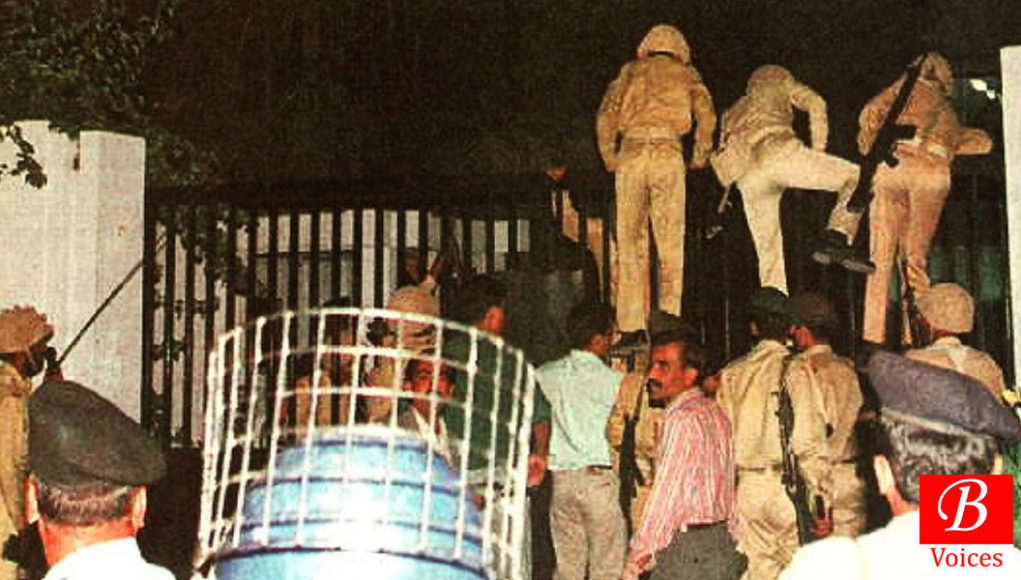Ayaz Khanzada
Emergence of two independent states India and Pakistan, after the clouds of slavery under the two centuries of colonization had faded away, started a journey towards fulfilling the foreseen dreams of their founding fathers. India, which had been much stable in terms of infrastructure and political intellect along with a large number of military and equipment, managed to travel on smooth path of progress; however, Pakistan was left with fewer assets to initiate its journey ahead. To meet the required level of trained soldiers for an army comprised 150,000 in order to train young recruits, even Quaid-e- Azam inducted 500 British officers temporarily. Perhaps, this move by the founding father paved the way for the then Lt. Colonel, later Major General, Akbar khan to orchestrate a conspiracy for a coup d’état known as ‘Rawalpindi Conspiracy’.
To elucidate the fact that Quaid’s endeavor was based on principles that laid the foundation of a ‘welfare’ state, his notion regarding army reflects an elaborate example to keep army in barracks rather than making it part of governing process. Air Marshal M. Asghar Khan, Commander-in-Chief Pakistan Air Force from 1957 to 1965, quotes Quaid while replying to Major General Akbar Khan in his book ‘We’ve Learnt Nothing from History’. Author writes after the inception of Pakistan on 14 August 1947, Quaid had given a large reception at Governor-General’s House, now the Governor House, in Karachi. Major General Akbar khan conveyed his grievances over induction of 500 British officers in Pak army which he (Akbar Khan) believed to be an illegitimate control over country’s destiny. The Quaid raised his finger and said: “Never forget that you are the servants of the state. You do not make policy. It is we, the people’s representatives, who decide how the country is to be run. Your job is only to obey the decision of your civilian masters.”
What happened after the untimely demise of the founding father was an abortive attempt to topple the civilian government of Liaquat Ali khan by the Major General Akbar khan, but he could not proceed further with his intention to topple the civilian government. The pathetic years onward 1956, had put the nation under the claws of constant military coups. However, the most pathetic was the unresisting attitude of the masses towards the imposition of totalitarian governments in Pakistan.
There were and still are two major pitfalls that pave the way for coup d’état. The first pitfall rests with weak civilian government and its policies which bring the civilian government at the cross roads where it is left with only option to call army forward for assistance. Establishment of military courts is an example in itself where it is true reflection of army’s disbelief in speedy trails by judiciary; however, it is also true that civilian courts are throttled with mounds of pending cases that not only hamper speedy trails of criminals but often pave the way for hard core criminals and terrorists to be escorted free.
Another pitfall, in civilian government, is the lack of political will which often keeps political parties poles apart. Intra-party strifes are often ripe within political parties which keep engendering new parties with new agendas. Soon after inception, such intra-party strifes with folds of Muslim League emerged owing to which the nascent democracy in the newly born country lasted for merely a decade. In the case of Jinnah-Liaquat relationship, which was the corner stone of Muslim League’s existence, Liaquat-Desai agreement is enough to delve into Jinnah and Liaquat’s intimate relationship. Even the cleavage between Jinnah and Liaquat had grown to an extent that Jinnah did not enlist Liaquat when Muslim League nominees on the Viceroy’s Executive Council were sent to Lord Wavell in the first place.
Second pitfall is the rhetoric of Islamic rule (Sharia) and Pakistan perceived as an Islamic state, which were engraved in the minds of masses since the right-wing political parties, which had opposed the creation of Pakistan at first place, started to hold their hegemony over the country. Substantially, Quaid had dreamt off a Muslim state, which according to Stephen P. Cohen refers to a state whose citizens are entirely or predominantly Muslims. And, Islamic state, according to K.K. Aziz in his book ‘Murder of Hiatory’, refers to the imposition of Islamic rule and makes the masses to adhere to those rules. He furthers says if it is preferred in contemporary Pakistan then which concept of Islamic rules shall be followed, as every clergy has its own version of Islamic rule. Similarly, legitimizing his ‘Islamization’, Zia-ul-Haq consolidated his hegemony over masses for 11 years. K.K. Aziz writes the text books those published under Zia’s regime deliberately distorted the history and made Zia the only person to make Pakistan an Islamic state while terming previous all governments, western puppets.
Calling militarily to dig in is not a new phenomenon in the country where army is frequently seen helping masses in case of any disaster, curbing terrorism and even checking meter readings and helping in completion of census. But, the recent resistance to military coup in Turkey, a country that almost fell into the web of military coups after two years of imposition of first martial law in Pakistan, by the pro-democratic masses corroborates the concept that even a dilapidated democracy is hundred times better than a totalitarian regime.
Writer is a student; pursuing his Masters Degree in Mass Communication. He is an avid reader as well as a bibliophile.
Disclaimer: Views expressed in this article are those of the author and Balochistan Voices not necessarily agrees with them.
Share your comments!








